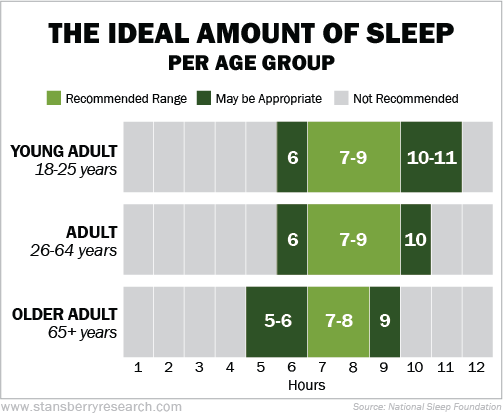It's common knowledge we've heard all our lives... The ideal amount of sleep is eight hours per night.
But that's a lie...
In fact, up until the late 1600s, people used to sleep for a few hours with one to two hours of activity in between. This sleep pattern is called segmented sleep. And a night of sleep was referred to as "first sleep" and "second sleep."
But as society evolved, the way we sleep did, too.
During the Industrial Revolution, life was all about productivity and efficiency. The segmented sleep patterns of the past conflicted with the long workday and rigid factory schedules.
In 1817, Robert Owen – a Welsh manufacturer and labor rights activist – gave birth to the idea that each day should be divided into three eight-hour segments: eight hours for labor, eight hours for recreation, and eight hours for sleep.
This is how we got the idea that we need to sleep eight hours a day... Not from a scientist or a health professional, but from a business owner.
Today, we are still obsessed with productivity and efficiency. We're rarely encouraged to listen to what our bodies tell us about our needs. And, unsurprisingly, when it comes to sleep, one size rarely ever fits all. But in today's world of caffeine and bright indoor lighting, it's hard to tell if you're sleep deprived.
Recently, one of our readers sent us a new sleep study that claims sleeping less than four and a half hours or more than six and a half hours is associated with cognitive decline.
So we looked into it... and the study sucks.
The crux of the matter is why are people sleeping this much or this little... Is disrupted sleep a symptom of cognitive decline, or is cognitive decline a symptom of disrupted sleep?
As we age, our brains change. Newborn babies typically sleep 14 to 17 hours each day because their brains are developing rapidly, and sleep allows this to happen. Once we reach adulthood, our sleep needs become between about six and a half to nine hours each night.
If I suddenly started sleeping as much as a newborn, it would indicate a real problem.
The structure in our brain that regulates our sleep-wake cycle is called the hypothalamus. Throughout a 24-hour period, the hypothalamus responds to environmental cues like hunger, stress, and daylight by making hormones like ghrelin, cortisol, and melatonin, respectively, which impact how alert or sleepy we are.
It's common for our hormone production and activity levels to decrease as we get older, and this has a big impact on our ability to sleep. Less melatonin – which usually peaks between 3 a.m. and 4 a.m. – can mean disrupted sleep.
Here's what the ideal amount of sleep looks like... You'll notice it changes only slightly based on age...

You'll notice that the times for each age group are a range, because it's slightly different for different individuals. If you're in this range, you're probably getting enough sleep.
But during this time of year, we're all extra groggy because we're getting less sunlight and the daylight savings time shift throws us off our usual rhythm.
So the quality of our sleep is really what we want to assess. Take my sleep-latency test today and find out if you're sleep deprived:
- In the mid-to-late afternoon (not too close to bedtime) change into your sleep clothes and pick a place to fall asleep where you can turn down the lights – this could be in your bed, on the couch, or in a comfortable armchair.
- Place a metal cooking sheet or pan on the floor beside your resting place and hold a metal spoon in your hand above the pan.
- Write down the time, and then close your eyes and let yourself fall asleep.
- Once you're fully asleep, your hand will release the spoon. The sound of the spoon hitting the sheet or pan should wake you up. Record the time again at that moment. (If you're a heavy sleeper or have trouble hearing, ask your partner or a friend to sit with you during this experiment and record the time for you.)
For a well-rested person, it will take about 15 to 20 minutes for the spoon to hit the sheet or pan. A sleep deprived person will fall asleep in five minutes or less. If you're sleep deprived, don't worry because we can help with that.
On Thursday, I'll share my five tips for excellent sleep hygiene so that you can make sure you're getting the right amount of sleep to suit your needs.
What We're Reading...
- Individual differences in sleep structure are biologically determined.
- Something different: Using mechanical tools improves our language skills, study finds.
Here's to our health, wealth, and a great retirement,
Dr. David Eifrig and the Health & Wealth Bulletin Research Team
November 30, 2021
